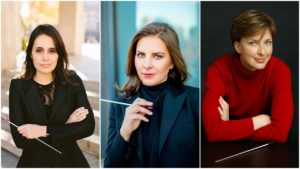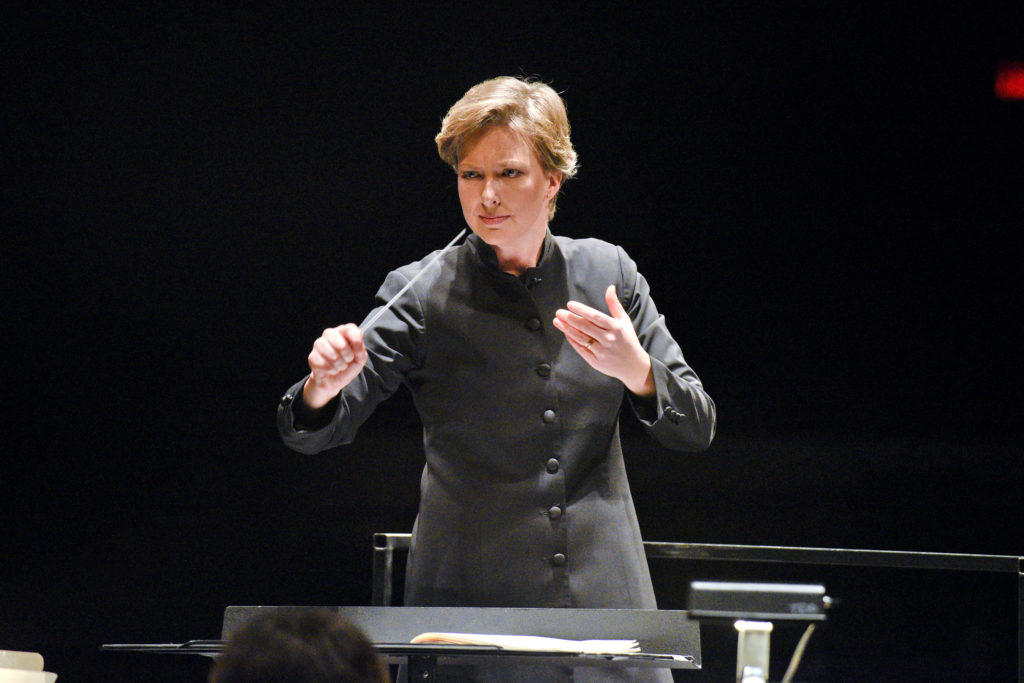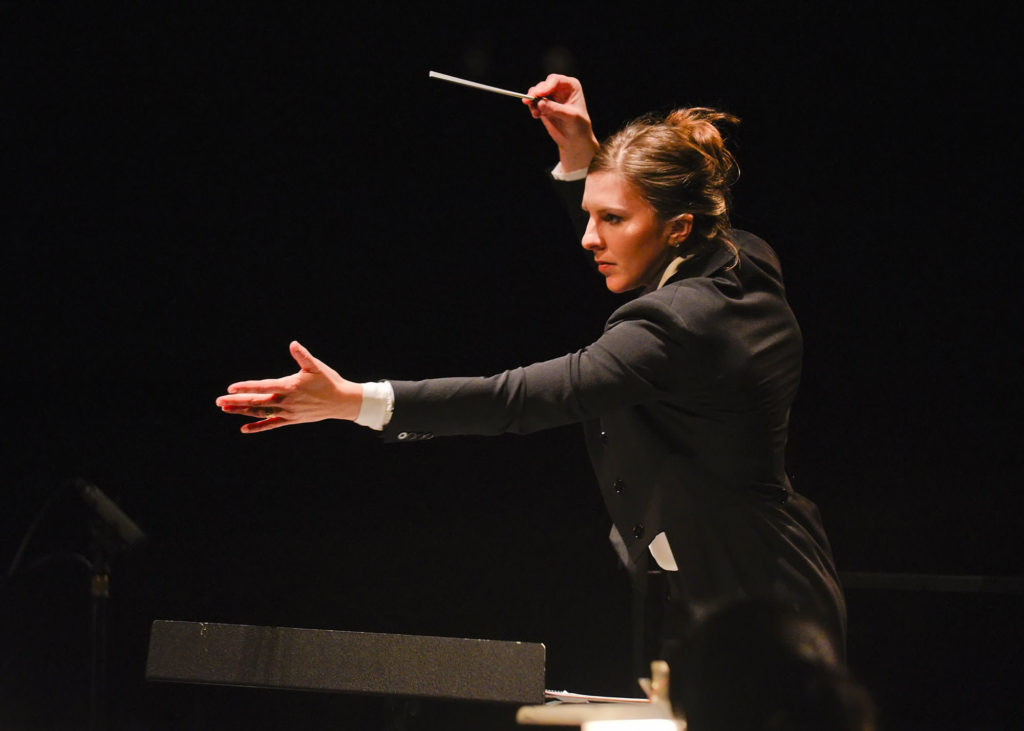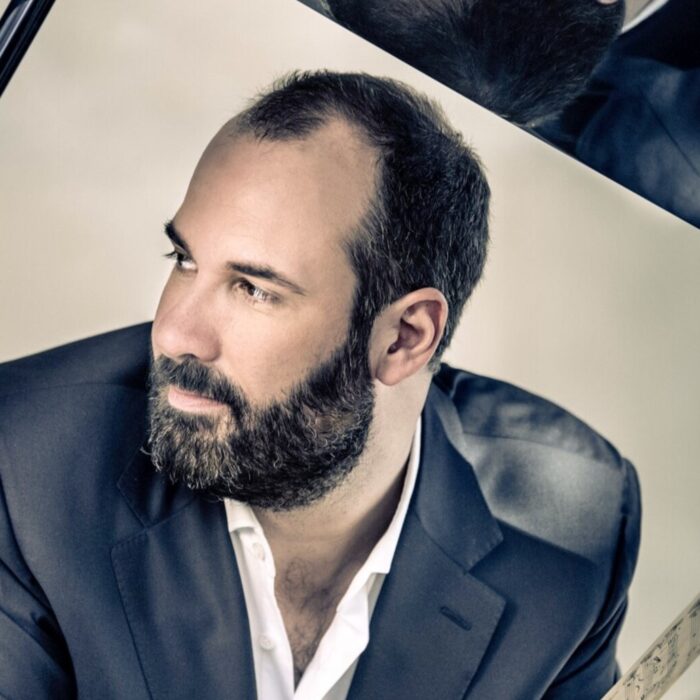
Q & A: Lina Gonzalez-Granados, Lidiya Yankovskaya, & Elizabeth Askren On How The Hart Institute For Women Conductors Helped Shape Their Careers
By David SalazarFor five years, the Dallas Opera’s Linda and Mitch Hart Institute for Women Conductors has done something that few other major companies have done – champion women conductors.
The program, the first ever designed to meet the needs of women opera conductors, has allowed participants an opportunity to engage in a wide-range of musical opportunities alongside some of the most acclaimed music directors working today. The organization also places a premium on helping the participants navigate the business aspects of the business, helping them select the right artist manager and take on fund-raising, personal branding, and media management, among others.
Over those five years, the Institute has nurtured a number of major artists who are now having strong careers around the opera world. Among those are Lina Gonzalez-Granados, Lidiya Yankovskaya, and Elizabeth Askren.
Askren is a 2016 alumnus who is now a faculty member with the Institute. She has worked alongside the Romanian National Academy of Music and is the founder and artistic director of the Transylvanian Opera Academy.
Gonzalez-Granados went to the Institute in 2017 and is set to appear with such organizations as Philadelphia Orchestra, Seattle Symphony, San Diego Symphony, Stamford Symphony, San Francisco Conservatory and the Orchestra Sinfónica del Principado de Asturias throughout 2019.
Meanwhile, Yankovskaya made history as the only woman to be the music director of a multimillion-dollar opera company in the United States when she took over the role with the Chicago Opera Theater.
OperaWire had an opportunity to speak with the three conductors about their careers and their experiences with the program.
OperaWire: What, in your view, are the keys to being a good conductor?
Lina Gonzalez-Granados: Adaptability, openness, generosity and resilience both in the podium and outside. Discipline and a sense of purpose, that surpasses career ambitions.
Lidiya Yankovskaya: The key is understanding that it is not about you. Contrary to stereotypes, egos and conducting don’t go well together. Conductors don’t make any sound—our work relies entirely on collaborating with, empowering, inspiring, and unifying others.
Elizabeth Asken: Curiosity; honesty; strength (conviction); listening (crucial!) and empathy skills; dual ability to rationally organize and conceptualize music seasons, rehearsal plans, etc. and perform with authenticity and generous abandon.
OW: When did you know that you wanted to be a conductor?
LGG: I was 16 years old and it was my first concert as an alto in my college choir… I saw the sense of purpose and passion in the conductor and I knew in that moment I needed to be her. I was trained as a Pianist, and I felt after that making music around my friends was going to represent more for me as an artist than spending 12 hours alone with my piano.
LY: The first time I stepped on the podium, at age 17, I knew that I would always want to conduct. Dedicating myself to pursuing it as a career came much later, when I was in graduate school.
EA: My first musical experience was a conducting experience and I was too young to remember it. As my mother tells the story, when I was 3, whenever I heard classical music I would take my building blocks (tinker toys) as double batons, prop my story book up as a score and “conduct”. That prompted my mother to get me to piano lessons! Several years later I was admitted to the Juilliard School of Music in its pre-college division. During my senior year I took composition and had composed a piece for choir, string ensemble and percussion. Somebody had to conduct the work for its performance, and that somebody turned out to me! That was my first experience at the podium; I was 16. When I was 19, my Choral Conducting teacher at Oberlin Conservatory looked at me during a private lesson one day and simply said: “You know, Elizabeth, you could really do this.” It was like a door opening to me, and I walked through.

OW: What has been one personal challenge that you have overcome to this point your career to help you find the success that you have had?
LGG: Living on the road has always been incredible, but it took time to get used to because I miss my family every time.
EA: During my professional development as a conductor, I made the unorthodox decision to protect my family life in order to acheive a work-life balance which was crucial for me. This has meant working extra-hard to prioritize both elements, including taking time off for a while to raise my daughter in her first years, and refusing posts which would have too violently disturbed this equilibrium. Now that my daughter is older, I can reajust my schedule once again to include more professional engagements. By remaining faithful to what was most vital to me – which is both my art and my family – I have remained grounded, happy, and fulfilled.
OW: What was the experience of being a part of the Hart Institute for Women Conductors?
LGG: I Remember the Hart Institute being one of the most intense experiences outside the professional world. I was exposed to superb music making, and had more podium time with a professional orchestra than I ever had in a Masterclass setting. After the Hart institute I had the opportunity to attend other similar events with big organizations, and nothing ever came close. The commitment of the Hart Institute goes beyond the two weeks I went in 2017, so it feels that I’m still part of it.
EA: The Hart Institute was a tremendous recognition for the hard work and professional inroads I had been making in Europe. After living and working in Europe for 10 years following my studies in the States, I felt it was time to re-enter the American music scene. The Hart Institute was the perfect opportunity to be seen, encouraged, and showcased by a significant, level 1 opera house. I was also very happy to meet my colleagues from around the world. It was very inspiring to see everyone’s accomplishments and share our different strengths and experiences.
OW: What were some of the most notable takeaways from your experience with the Institute?
LGG: What I love most about the program Is that still count on the support and friendship of everyone I met while I was there. Starting for our Mentor Carlo Montanaro, to everyone on staff. To this day I keep some communication with all of them.
EA: I remember being so impressed with the level of the Gustav Mahler conducting competition when I competed as a finalist candidate in 2010. Everything was first-rate, from the seemless administrative organization and the beautiful hall itself to the incredible Bamberg Symphony Orchestra. Moreover, the world-class judges were truly concerned with preserving the integrity of the competition and in supporting the ten invited candidates. I hadn’t found such a program of remarkable quality again – until I experienced the Hart Institute in 2016. Everything — the selection of guest artists and speakers, the administrative organization, the wonderful Dallas Opera orchestra, and the arresting Winspear itself – was first-rate.

(Credit: Karen Almond)
OW: What surprised you most about the program?
LGG: It is uncommon to have an Advancement program where you are treated as a guest artist rather than a student, It really makes the difference to be able to get out of work and not suffer an economic hit. We are all working professionals, and we were treated as such, and even more.
On another subject, the global approach that is not only focused on the music making, but industry cultivation which is unique to this program and put the alumni on the map for bigger things. The conductors at the Hart Institute acquire expertise on donor cultivation, administrative interactions, we are being prepared at the highest level for bigger roles than any other advancement opportunities.
EA: The continued support and excellence in subsequent Hart Institute events has surprised me the most. Since my initial residency in 2016, the Hart Institute has taken me to San Fransisco to work with the San Francisco Opera’s Merola artists, back to Dallas to be showcased during the Opera America conference, and to New York City to work with my alma mater, the Juilliard School, and staff from the MET. I was subsequently invited to the Dallas Opera as assistant conductor, guest conductor, and now a faculty member for the 2019 edition of the Hart Institute. The direction’s investment and commitment to the Hart Institute’s alumnae have been exemplary, and is a model world-wide.
OW: What in your view, does this program mean and what is its greatest impact on the opera community? How do you hope to see the program grow in coming years?
EA: The Hart Institute was created to identify, mentor, and showcase significant women leaders in opera and develop their careers to the next level. Under the distinguished direction of opera powerhouse David Lomeli, an incredible array of conductors and executive administrators from around the world have been scouted and supported by the program. Thanks to David’s unparalleled knowledge and taste, alumnae from the Hart Institute will be the ones to watch on the international opera scene.
LGG: This program is absolutely necessary in the Opera community which has been changing rather in a slower rate, compared to other subjects of the music industry. My hope is that there are meaningful collaborations in the future with opera houses directly where the Conductors of the Hart institute can be guests and serve in the role of assistants, so we see the impact everywhere, at a faster rate. I think other opera houses can benefit with the impact that Dallas Opera and the brand of the Hart institute is making.
LY: For many very accomplished conductors, it’s a challenge to have stellar work at small organizations noticed by bigger companies. This challenge is magnified for women and those from other underrepresented groups. The Hart Institute’s recognition of promising conductors gives them a platform to prove themselves. I hope that through the IWC, we will have increasingly more women in major conducting positions at opera houses around the world.

(Credit: Karen Almond)
OW: In what ways did being a part of the program help you grow your career?
LGG: I have an endless resource of expertise both musically and about the industry 24/7 because the staff in charge is always committed to my success and to see me thriving. Since the program I have been both in the opera and orchestra conducting worlds at the highest level and I owe the preparation for these great opportunities to my mentors in the institute who have been always on my side when I need them.
OW: What is one piece of advice that you would like to give other aspiring women looking to make a career as a conductor?
LGG: There is not one definite path already traced in order to make a career happen, so make your own decisions and your light shine instead of being someone’s shadow. Be unapologetically yourself, and surround yourself with people that support you.
LY: The same advice I would give to anyone trying to make a career as a conductor – be yourself and find what YOU are passionate about. Then, work tirelessly to become the best you can be at realizing your artistic goals.
EA: If your life-long goal is to communicate the greatest human thoughts and emotions through the vessel of music and the métier of conducting, you must: Listen and understand those you want to communicate with; study, intimately and extensively, the repertoire; observe those who have mastered the métier; practice the craft actively, humbly, and constantly; and live a healthy and well-rounded life, in order to experience the truths conveyed in masterpieces.


